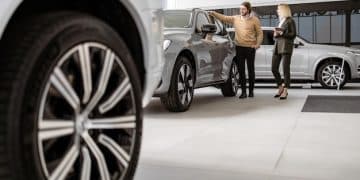Used Car Buying Guide 2025: Avoid Lemons and Hidden Problems

Navigate the used car market in 2025 with confidence by learning how to identify potential problems, avoid costly mistakes, and ensure you’re driving away with a reliable vehicle.
Purchasing a used car can be a smart financial decision, but it also comes with potential pitfalls. Our Used Car Buying Guide 2025: Spotting Hidden Problems and Avoiding Lemons equips you with the knowledge needed to make an informed choice and steer clear of troublesome vehicles.
Why Buy a Used Car in 2025?
The allure of a used car remains strong in 2025, driven by factors such as affordability and depreciation. However, understanding the market dynamics is crucial before diving in.
Financial Advantages
Used cars offer a significant price advantage compared to new models. The initial depreciation hit has already been absorbed, allowing buyers to acquire a vehicle at a lower cost.
Market Trends
The used car market in 2025 reflects a blend of traditional and emerging trends. Increased online marketplaces and digital tools are transforming the buying experience.
- Lower Purchase Price: Save thousands compared to buying new.
- Slower Depreciation: Used cars depreciate slower than new cars.
- Wider Selection: Access a larger variety of makes, models, and features.
- Reduced Insurance Costs: Often, used cars have lower insurance premiums.
Making a financially sound decision involves balancing the initial cost savings with the potential for maintenance and repairs. Thorough research and inspection are key.
Setting Your Budget and Needs
Before browsing used car listings, it’s essential to define your budget and assess your specific needs. This groundwork will streamline your search and prevent impulsive decisions.
Determine Your Budget
Establish a realistic budget that includes not only the purchase price but also associated costs like taxes, registration fees, and insurance.
Identify Your Needs
Consider your lifestyle, daily commute, and passenger/cargo requirements to determine the ideal vehicle type.

Prioritizing your needs helps narrow down your options and ensures you choose a vehicle that aligns with your daily demands and long-term plans.
Where to Find Used Cars
The quest for a used car can lead you to various avenues, each with its own set of advantages and considerations. From dealerships to private sellers, explore the options to find the right fit.
Dealerships
Dealerships offer a structured environment and often provide certified pre-owned (CPO) programs with warranties and inspections.
Online Marketplaces
Online platforms offer a vast selection and the convenience of browsing from home, but require diligent research and inspection.
- Extensive Inventory: Access a wide range of vehicles from different sellers.
- Detailed Listings: Review vehicle history reports and inspection details.
- Price Comparison: Compare prices from various sources to find the best deal.
Each source has its trade-offs, so weigh the options based on your desired level of convenience, assurance, and price negotiation.
Inspecting the Car: What to Look For
A thorough inspection is critical to uncovering hidden problems and assessing the vehicle’s overall condition. Take your time, be meticulous, and don’t hesitate to seek expert advice.

Exterior Inspection
Examine the body for rust, dents, and mismatched paint, which could indicate prior accidents or repairs.
Interior Inspection
Check for worn upholstery, malfunctioning electronics, and unusual odors, which could signify mold or water damage.
A comprehensive inspection reveals the car’s true condition and helps you make an informed decision about its reliability and value.
Test Driving: Feeling the Ride
The test drive is your opportunity to experience the car’s performance and identify any underlying issues. Pay attention to handling, braking, and overall comfort.
During the Test Drive
- Smooth Acceleration: Check for any hesitation or rough shifting.
- Responsive Braking: Ensure the brakes are firm and effective.
- Comfort and Handling: Evaluate the ride quality and maneuverability.
A well-executed test drive provides valuable insights into the car’s performance and helps you determine if it meets your needs and expectations.
Reviewing Vehicle History Reports
Vehicle history reports provide crucial information about the car’s past, including accidents, title issues, and odometer readings. Don’t skip this step to avoid potential scams or surprises.
What to Look For in a Report
Review the CARFAX or AutoCheck report for any red flags, such as salvage titles or undisclosed accidents.
Understanding the Data
Use the information to assess the car’s overall condition and predict potential maintenance needs.
Vehicle history reports offer transparency and empower you to make a well-informed decision about the car’s true value and potential risks.
| Key Point | Brief Description |
|---|---|
| 💰 Budgeting | Set a realistic budget including all associated costs. |
| 🔍 Inspection | Thoroughly inspect exterior, interior, and mechanical components. |
| 📜 Vehicle History | Review vehicle history reports for accidents and title issues. |
| 🚗 Test Driving | Test drive to assess performance and identify potential issues. |
FAQ
The end of the year, particularly December, is often a good time to buy a used car. Dealerships are looking to meet quotas, and you might find better deals as they clear out older inventory.
A pre-purchase inspection by a trusted mechanic is extremely important. It can uncover hidden issues that aren’t apparent during a visual inspection or test drive, saving you costly repairs later.
If a seller refuses a pre-purchase inspection, it’s a red flag. It suggests they might be hiding something about the car’s condition. It’s best to walk away and find a seller who is transparent.
Yes, negotiation is a common part of the used car buying process. Use research data, like the car’s market value and any identified issues during inspection, to justify your offer and negotiate a fair price.
Review the vehicle history report, title, and any maintenance records. Ensure the VIN on the documents matches the car. Verify the seller’s identity and ownership to avoid legal issues down the road.
Conclusion
Embarking on a used car purchase in 2025 can be a rewarding experience when armed with the right knowledge and approach. By understanding the benefits, setting a budget, inspecting diligently, and leveraging available resources, you can confidently navigate the market and drive away with a reliable and affordable vehicle.





